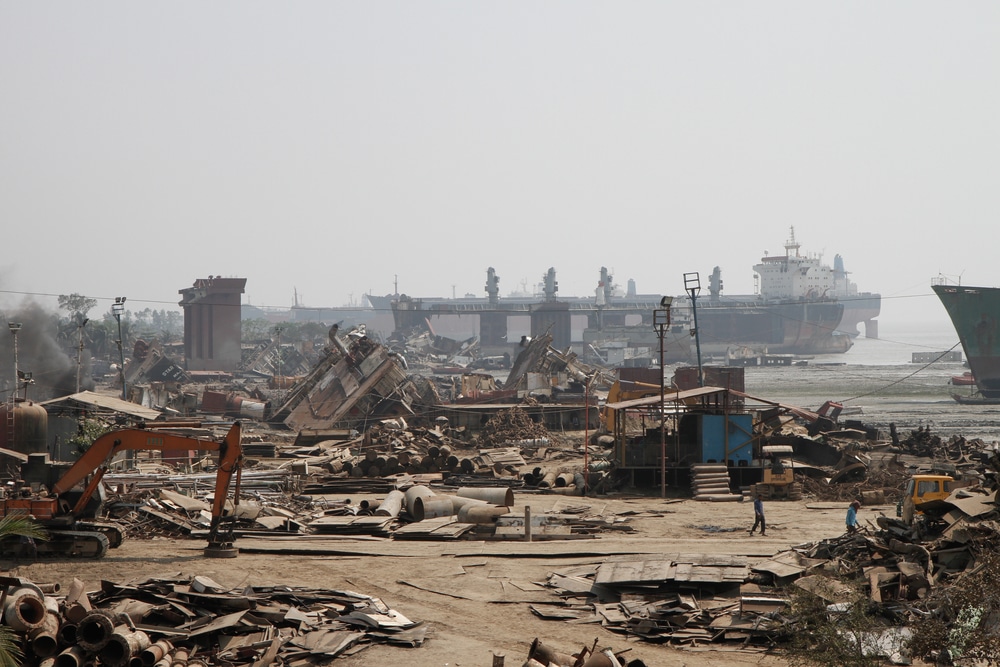
A new report from the United Nations Conference on Trade and Development (UNCTAD) shows that maritime accidents and injuries are incredibly common among ship breakers. In fact, traumatic maritime injuries and deaths have become a way of life for ship breakers in certain parts of the world.
Sadly, occupational research is incredibly limited. Research studies are nearly non-existent because of where ship breaking most often occurs. Greenpeace and the International Federation for Human Rights estimate that as many as 1,000 ship breakers have died this year due to exposure to toxic waste. Several hundred ship breakers are estimated to become ill each year due to toxic exposure while ship breaking and in the scrap yards.
Maritime Accidents and Injuries Go Unreported
Researchers believe that a majority of maritime accidents and injuries among ship breakers are never reported. Workers who are seriously ill or injured may be forced to leave if they report an incident. Most ship breakers who are injured on the job cannot access proper medical care. Most only have access to free, low quality public care. There is no insurance or workers’ compensation system.
In Bangladesh, there are no laboratories and hospital facilities are ill-equipped to handle diseases. As a result, employers take no responsibility for occupational illness. Ship breakers and their families are left to bear the brunt of the economic and medical costs of a poor work environment.
There is no registry kept for ship breakers so it is difficult to track injury and death rates. There are allegations that the bodies of ship breakers who die on the job are hidden. Furthermore, employers bribe police and the media not to report the fatality.
What is Ship Breaking?
Ship breaking is the process of dismantling a vessel that is no longer in use. This is often oil tankers, container ships and bulk carriers. Ship breakers dismantle these behemoths on the seashore in a tedious process of removing gear and equipment, cutting down the structure, and separating recyclable materials.
In Bangladesh, 47% of the world’s vessels are dismantled by crews of workers in Sitakunda. Bangladesh, India and Pakistan make up 70-80% of the recycling market for ocean vessels across the world. In Bangladesh, the recycled scrap metal is milled and re-rolled for use in construction projects.
Workers recycle more than the ship’s hull. Engines, electrical parts, generators, boilers, furniture, plumbing and refrigerators all have a stable market in Bangladesh.
The Risks of Ship Breaking
In Bangladesh, the ship breaking industry is located on a 10 kilometer stretch of seashore. Several thousand workers directly engage in ship breaking, while thousands more are involved in the business downstream.
Sadly, because ship breakers are often poor and lack education or training, they often work without protective gear. Workers are often found working without respirators, hard hats, steel-toe boots or protective clothing. In fact, most workers are not provided with even minimal safety training or gear that may be required.
The risks of ship breaking are tremendous, and a lack of protective gear is a recipe for maritime accidents. During ship breaking, workers are exposed to direct hazards and environmental hazards. The majority of maritime accidents among ship breakers involve:
- Confined spaces
- Falls
- Fires or Explosions
- Asphyxiation
- Crush injuries
- Being struck by falling objects
- Toxic chemical exposure
- Asbestos exposure
This is only a short list of the risks. There are numerous environmental risks, as well as risks that are often overlooked, such as tools, noise and temperature.
In addition to the risks to ship breakers, ship breaking has an impact on the local communities and environment. Solid waste, oil and grease are often dumped into the ocean. Fuel remnants and oil are found in coastal waters near ship breaking yards, and they contaminate marine life.
Fumes and airborne hazards are also toxic to local communities. Asbestos fibers and toxic fumes leech to nearby communities putting residents at risk. The result is communities inhaling pollution, ingesting polluted water, eating contaminated fish and eating vegetables grown in toxic soil.
Ship Breaking in the United States
Ship breaking still occurs in the United States, but to a much smaller degree. There are a few companies that oversee these processes. Unlike Bangladesh, the U.S. has specific rules and guidelines for dismantling ships and disposing of hazardous materials. There are regulations for the disposal of:
- Hydrocarbons
- Lead paint
- Asbestos
- PCBs
The primary reason why ship breaking still occurs in the U.S. at all is because of federal policies that prohibit government ships from being dismantled in other countries.
Maritime Accidents in the U.S.
Maritime accidents in the ship breaking industry are also a concern here in the U.S. Fortunately, our government has regulations that help prevent many of the accidents and injuries that occur in Bangladesh.
Also, maritime workers in the U.S. have protections under maritime law, such as the Jones Act and the Longshore and Harbor Workers’ Compensation Act (LHWCA). These laws allow maritime workers to receive benefits and compensation that is similar to standard workers’ compensation, which does not apply to the maritime industry.
Maritime workers may qualify for maintenance and cure benefits, as well as protections under other maritime laws. Workers may be able to recover compensation for their medical expenses, lost wages, and pain and suffering caused by maritime accidents.
Ship breakers in the U.S. who suffer an injury or illness while working may find it helpful to discuss their situation with a maritime lawyer. A maritime lawyer can help determine your legal rights and what compensation or other benefits you may qualify for.
Call Maritime Injury Guide to learn more at 866-871-8422. Or, send us an email to request a free injury consultation.
Sources:
- https://www.clui.org/newsletter/spring-2010/american-ship-breaking
- https://www.hellenicshippingnews.com/occupational-safety-of-ship-breaking-workers/